Superhero Live Action Shows: Conventions and Evolution
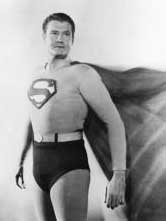 The superhero genre has been a hit in America since the mid-1900s. It has grown so large today that a distinction needs to be made on what type of superhero show is being talked about such as cartoon or live action. I will be focusing on the live action series. The first live action superhero show, The Adventures of Superman, was aired in 1952 and they are still being produced and aired. The live action superhero genre is currently thriving in American society and shows are popping up on different networks. They are available to stream on pretty much every device, and Netflix even produces their own shows about the superheroes that comic book readers have been reading and have been in love with for years.
The superhero genre has been a hit in America since the mid-1900s. It has grown so large today that a distinction needs to be made on what type of superhero show is being talked about such as cartoon or live action. I will be focusing on the live action series. The first live action superhero show, The Adventures of Superman, was aired in 1952 and they are still being produced and aired. The live action superhero genre is currently thriving in American society and shows are popping up on different networks. They are available to stream on pretty much every device, and Netflix even produces their own shows about the superheroes that comic book readers have been reading and have been in love with for years.
The Big Three of DC Comics
In 1952, The Adventures of Superman was released and aired for six years. The first half of the series’ life was filmed in black and white while the last half was released in color. As the name suggests the show followed Superman and his heroics while saving Metropolis and the world from his enemies. The television show was created as a follow up to the movie Superman and the Mole Men. The cast of the show was actually surprised that the show did as well as it did. Following the Superman series there was several others that were produced: Batman in 1960 and Wonder Woman in 1975 were a couple of the next high profile super heroes to get shows.
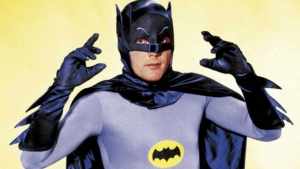 The Batman series from 1966 is still a favorite among super hero fans today even though by today’s standards the show is cheesy, and almost unbearably so. However, the show has remained to be a classic. Adam West playing Batman gave the show a leading actor that was extremely likable and Robin’s boyish charm brought some humor to a show that could have turned out to be of a darker tone. Then there is the theme song, which Batman fans still love today and to a degree even those who do not like Batman still identify the song with the series.
The Batman series from 1966 is still a favorite among super hero fans today even though by today’s standards the show is cheesy, and almost unbearably so. However, the show has remained to be a classic. Adam West playing Batman gave the show a leading actor that was extremely likable and Robin’s boyish charm brought some humor to a show that could have turned out to be of a darker tone. Then there is the theme song, which Batman fans still love today and to a degree even those who do not like Batman still identify the song with the series.
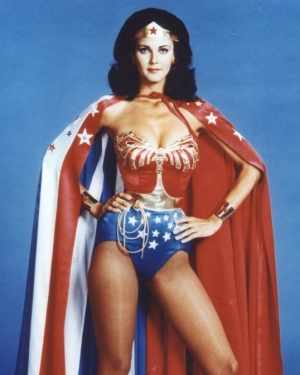 Wonder Woman being a superhero is an interesting story in itself. During the wars, particularly World War II and the Cold War, the comic book industry was looking to create characters that would inspire the people and give them hope. Marvel Comics came up with Captain American and DC created Wonder Woman. Keeping true to her roots she wears red, white, and blue in most adaptations even today. Her series, although short lived with only running for one season, captured this image. She was a patriotic icon and a role model for women, who were fighting their own fight for justice at the time. The show got really good reviews from critics, but the writers said she was a dated hero and had lived out her purpose. In their own way both of these shows were liked by their audiences.
Wonder Woman being a superhero is an interesting story in itself. During the wars, particularly World War II and the Cold War, the comic book industry was looking to create characters that would inspire the people and give them hope. Marvel Comics came up with Captain American and DC created Wonder Woman. Keeping true to her roots she wears red, white, and blue in most adaptations even today. Her series, although short lived with only running for one season, captured this image. She was a patriotic icon and a role model for women, who were fighting their own fight for justice at the time. The show got really good reviews from critics, but the writers said she was a dated hero and had lived out her purpose. In their own way both of these shows were liked by their audiences.
Superheroes are Everywhere
Superhero shows did not cease to be made with the end of the 1970s. In the 1990s The Flash series aired. Looking at the show with today’s standards it still had an air of cheesiness, the same as earlier examples of live action superhero shows. That being said, the show implemented just enough of the available technology, that when blended with the charm of the older shows, a decent series was created that lasted a few seasons. With the new millennia also came new shows. These shows that started to arise featured prominent superheroes from both Marvel and DC Comics. The series Smallville (2001) revisited the iconic Superman but with a twist. The show focused on a younger Clark Kent before he donned his blue suit and red cape. His transition from a boy who had extraordinary powers, to the Man of Steel that we know, was documented on a personal level that showed how he, and those close to him dealt with his maturing abilities.
Within the past decade there has been a slew of new live action superhero shows: Arrow (2012), Flash (2014), Daredevil (2015), Supergirl (2015), and Jessica Jones (2015) are just some of the available programming. Within the next couple years there are shows on characters like Iron Fist, The Defenders, Luke Cage and others that are going to be released. With the current momentum these live action superhero shows have, they are probably not going to slow down any time soon. This is partially because there is a hype around superheroes with of all the movies that are coming out right now about them.
Conventions and Evolution
Over the years the shows have evolved in some aspects. The overall tone of the shows have been following a darker trend then when the first of these shows were aired. Batman and Wonder Woman were light-hearted shows that were meant to be entertainment for a younger audience. These shows were for kids and adolescents to watch for some clean television at night during the week. Batman was full of witty and corny jokes that were usually supplied by interactions between the Dynamic Due. There was even text blurbs in the shows that held action sound words such as blam and pow to signify the fighting instead of fully showing too much of the actual violence that was happening on screen. Wonder Woman was aimed more at teenagers. The show has episodes that involved high schoolers, idols, and celebrities of the time, or at least fictional counterparts for the real versions. She was meant as a symbol for female empowerment, as well as hope for the nation that patriotism was not dead; that America still stood proud and strong.
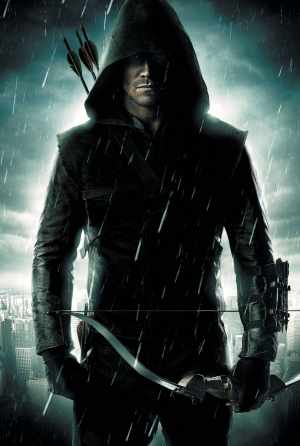 The series that have been released within the past decade and are continuing to be made have a bit of a dark tone. There is more violence that is being shown in detail. The colors that are being used tend to be blacks and the darker hues of blue, red, and green. The content has become more sexualized and the crimes that are being committed are more gruesome than they used to be because this is what audiences now want as a majority. In Batman the crimes that were committed were usually robberies or taking hostages. In the shows now there a lot more murders happening. Even the outcomes are not as cheery as they used to be. In the older shows once the episode, or occasionally the two part story, was over the hero has won with little or no loss to them. It has become common now for the hero to lose more often, and even if they do win it has become a frequent event for the hero to have lost something dear to them or fail to save everyone. The happy endings that were once so common in this genre are now few and far between. Along with this darker tone has come a darker hero.
The series that have been released within the past decade and are continuing to be made have a bit of a dark tone. There is more violence that is being shown in detail. The colors that are being used tend to be blacks and the darker hues of blue, red, and green. The content has become more sexualized and the crimes that are being committed are more gruesome than they used to be because this is what audiences now want as a majority. In Batman the crimes that were committed were usually robberies or taking hostages. In the shows now there a lot more murders happening. Even the outcomes are not as cheery as they used to be. In the older shows once the episode, or occasionally the two part story, was over the hero has won with little or no loss to them. It has become common now for the hero to lose more often, and even if they do win it has become a frequent event for the hero to have lost something dear to them or fail to save everyone. The happy endings that were once so common in this genre are now few and far between. Along with this darker tone has come a darker hero.
A common theme currently is the vigilante. The heroes of the first shows were either loved by the cops or in some cases even worker with the criminal justice system directly. Now the heroes lurk in the shadows just like their enemies do. They are often hunted by the law and afraid to let those around them know about this part of their lives.
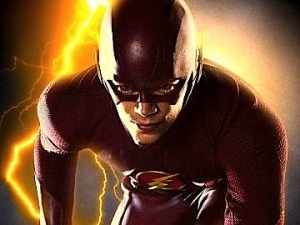 This shift in tone is partially due to a shift in the intended audience for the show. The age demographic has moved upward along the scale. How superhero shows were once for kids and teenagers, they are now more for adolescents and young adults. Instead of eight year olds sitting in front of the screen watching The Adventures of Superman, it is now more common to find high school and college student sitting down to watch Arrow or Flash. With the older audience base there is a higher level of maturity that the studios can work with.
This shift in tone is partially due to a shift in the intended audience for the show. The age demographic has moved upward along the scale. How superhero shows were once for kids and teenagers, they are now more for adolescents and young adults. Instead of eight year olds sitting in front of the screen watching The Adventures of Superman, it is now more common to find high school and college student sitting down to watch Arrow or Flash. With the older audience base there is a higher level of maturity that the studios can work with.
Something that might have not been included before because it would be too upsetting or adult for kids can now be shown because those who are watching for the most part are now mature enough to handle the material appropriately. In fact, the shows almost had to go darker in order to appeal to this demographic who as a whole are not as interested in content that is purely black and white. Morality appears greyer to adolescents and young adults as a whole then it did when they were children, and they tend to enjoy material that reflects that greying of morality because they can relate to it more.
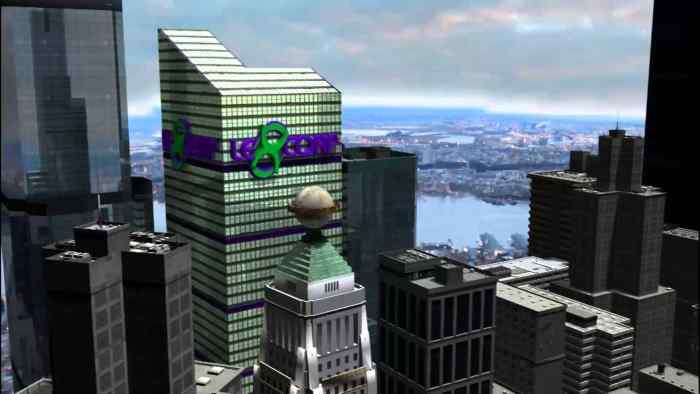
Even though there has been some changes in the overall tone of the shows there are some things that still hold true for the most part today as they did when live action superhero shows first started to become a hit. These shows typically take place in some kind of metropolitan area such as Gotham, and Metropolis. This is in part because it makes sense for there to be a lot of crime in the area since it takes place in a big city. A bunch of robberies happening in a small town all the time just would not make sense. The crimes that happen in these shows tend to be big crimes done by villains, not just average crooks. Once the hero starts to mature so does the people that they fight. It would be boring to watch Superman stop Joe from holding up some grocery store after episode. So they bring in the big boys such as Lex Luthur and Parasite. The normal criminals do not just disappear they are just handled by the cops, or they become included in the story by being the henchmen to the main villain.
The use of henchmen is a common technique in these shows. The main boss does not want to get his hands dirty so he sends other to do his work for him, and ultimately take the fall for him as well.
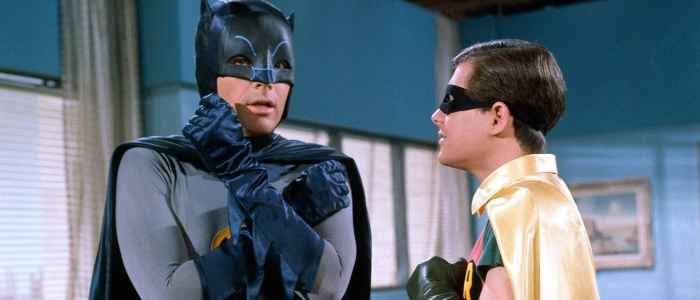
The hero may not always succeed anymore but they are still the focus of the show. The spotlight is on them and those that they care about most: family, friends, and sometimes even side-kicks. After all, what is Batman without Robin? There may come a point where they want to quit, and some will even hang up their suit “for good.” However, there is always something that happens that forces them to don the tights once more and fight for truth, justice, and the American way. This is commonly achieved by a villain kidnapping someone that the hero cares about and threatens to kill them if the hero does not show up at some place and a certain time where there is a trap awaiting them. This is just one of the more common plot lines that are employed in this genre. Some of the other are: something from the hero’s past comes back to haunt him; the villain tries to get revenge on those who put him away or “wronged” him in some other form; and the hero temporarily loses their powers due to illness or overexertion.
So Why the Infatuation with the Men and Women in Tights?
Live action superhero series are still popular because they still speak to the people. They changed just enough to keep audiences coming back for more, while holding on to what makes them what they are. The older group wanted more violence and choices that were not purely good or purely evil, and they got it. Yet, the heroes still seem like the “good guys”, even though they are just as violent as those they are trying to stop. These individuals are still an inspiration to audiences to aspire to a better tomorrow, even if today looks bleak. Above all the message of superheroes in general, and the shows about them, is still do not give up, keep hope in the future.
What do you think? Leave a comment.
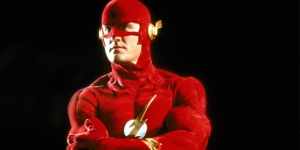
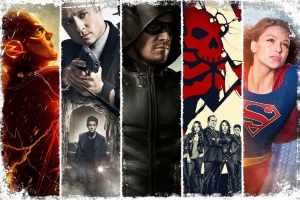










Arrow is an outstanding show.
It delivers in the way the Dark knight rises completely bungled.
There are far to many shows about superheroes.
We need some tv shows about supervillains to diversify the lineup. 😉
I like the way you think. Suicide Squad show anyone?
The market determines how many is “too many” of anything, and the interesting thing about this new wave of TV series adaptations of comic books is that none of them are getting the axe for inadequate ratings — and this is of course in a US network landscape notorious for having a very high percentage of attrition for first-season series (usually about 75% year to year). Until some of them fail to “bring the punters in,” these types of shows look like a pretty smart investment for the TV networks, and I will remain content to simply not watch them (the superhero ones, anyway).
I’m all for them as long as they do the source material justice and aren’t just treated as a quick cash in.
Nitpicks: WONDER WOMAN ran for three full seasons after a number of specials while the first THE FLASH series ran for only one season.
The theme of “the vigilante” did not become a major one in comic-book storytelling before the graphic novels BATMAN: THE DARK KNIGHT RETURNS and WATCHMEN emphasized that aspect of the superhero.
Great work here, very thorough.
“The hero may not always succeed anymore but they are still the focus of the show. The spotlight is on them and those that they care about most: family, friends, and sometimes even side-kicks. After all, what is Batman without Robin?”
On a small note, I do wish recent Batman adaptations would focus more on the Batfamily.
The 1990 Flash series was excellent and now seems like a dry run for Gotham but minus the hero shaped hole in the middle.
The new Flash is awful.
With great power comes great responsibility (Spiderman). There is nothin more important than standing up for what you believe (Captain America). Knowledge is your greatest power (Batman). We must always act in a way to create a more just world (Superman). Willpower is your greatest asset (Green Lantern)… I love superheroes.
There can never be enough superheroes on Tv, don’t like don’t watch, simple.
With TV schedulers managing to find time for endless hours of strictly x-factor coverage among the hundreds of channels on offer it would be absurd to ignore quality drama, or indeed, aimless thrills. After all, nobody forces anybody to watch…
Once every horror film from the last thirty years has been turned into a tv show (thats the next tv trend) you’ll be begging for more superheroes.
Arrow has been terrific!
It’s fantasy, that’s why people love it. But it’s not swords and dragons fantasy, and it’s not futuristic sci-fi. Those genres are so foreign to reality that the majority of audiences cannot connect with them as easily as a person, who lives in New York, putting on a mask.
Interesting read, and well written!
Whilst The Flash hasn’t really piqued my interest yet and Agents Of Shield is taking it’s time to get going this second season, The Arrow is still decent and hits a good balance. Why not have superheroes on TV, so long as the show they’re in is good?
You can never have enough superhero shows; unfortunately Flash is insipid and boring
The Flash is probably the best new show on TV.
There’s so many superheroes they’re ceasing to be super in any capacity.
Please explain this vague statement.
It’s swings and roundabouts. Through the decade leading up to 9/11 we had terrorists on every TV show and movie. Then is was Vampires and Zombies. We’ll be back with Westerns soon enough. I love the Superhero genre, and hope it lasts at least another few years before we’re all sick to death of it….
So what should us grown up watch endless murder mysteries, CSI, NCIS.
Of cause even most no superhero tv shows are about better than average human beings or certainly better than their colleagues.
What?
Superhero’s are modern day titans, 21st Century myth and legend. They are enjoying a resurgence in popularity because they transcend generations. Adults who once enjoyed reading about the exploits of their favourite superhero within the pages of comic books are rediscovering them on television and in film – where, as Father’s themselves now, they can share in their exploits with their own children.
I will never get sick of comic book and superhero shows/films. It’s not a trend. There’s a reason these characters have been around for decades and continue to thrive today.
I think it’s important to note that both DC and Marvel are leading up to big Justice League and Avengers movies that incorporates these characters.
There are also comic based shows that aren’t DC or Marvel made.
I see the phrase “superhero fatigue” bandied about a lot when it comes to the current comic book film and TV landscape and the overabundance of projects flooding the market. However, I’m a little confused at this statement. Superheroes are not a genre, they are practically a form of media in and of itself. There’s so much you can do with them and the variety of film and TV based on them reflects that variety, at least in my opinion.
I’m just hoping they do a season 2 for supergirl
I think you raise a lot of very interesting points, especially with the shift over time to focus on less diacotamized morality and increased frailities of the heroes themselves. Perhaps it is a focus on the humanity of the heroes, instead of being established as ‘perfect’ they become more human over time.
The current trend of superhero films/shows reminds me of the massive amounts of Westerns that were produced decades ago. The amount of superhero films has definitely not reached the saturation that Westerns reached at their peak, and they have a more intergenerational appeal than Westerns in my opinion, so it’ll be interesting to see what the peak of superhero shows/films will be like.
Great topic and it was very well written. The only other subtopic i would have liked to read about (which would drastically expanded the content of the article) would have been some of the creators of the heroes/heroins intentions. Bob Kane, for example, wanted batman to have a dark essence to his story. His interpretation of the 50’s Batman tv series was a negative critique of its implications. Kane strived to attract a mature audience and i think thats worth mentioning at least.
Thanks for writing!
Seeing the surge of superhero movies and TV shows (though moreso TV shows) has been wonderful as someone who is a fan of comics. While it doesn’t really feel like we’ve ever taken a real break from superhero movies (in my lifetime), the shows, the world-building that is being done right now is wonderful, both from a marketing standpoint, and a fanboying standpoint.
I would like to see a bit more diversity and open-mindedness in the portrayals. Give us Hawkeye – Matt Fraction’s storylines, where Clint is Deaf and Barney is in a wheelchair. There are still a lot of ways for the genre to improve.
It’s interesting that today, with services like Netflix, TV shows can explore darker aspects of superheroes than most of the movies are willing to attempt. I don’t think anyone would disagree that Daredevil and Jessica Jones are the darkest projects Marvel has taken on so far, and it would seem that Netflix superhero shows are only going to become more commonplace in the future.
I honestly think the change in tone for shows like these comes from a desire to make the superhero show seem more “realistic”. The crimes we know today are more gruesome and I think switching from the kiddy approach to portraying these heroes adds a layer their already exciting stories. Your analysis of this change contributes to the conversations about this genre!
Frankly, I really enjoy Superhero shows. They have a good balance of fun and seriousness, they are entertaining while also acknowledging serious and complicated issues. They have the ability to reach a wide range of audiences and I hope to see more superhero TV shows in the future.
I personally enjoy The Flash (2014, although 1990 is fun too). Where many superhero movies and shows attempt to go dark, gritty, and realistic, The Flash embraces its comic book roots. The characters are fun and likeable, and while many episodes focus on a villain of the week, the overarching stories are very powerful and carry a lot of emotional weight. Try getting through the season 1 finale without shedding a tear, I dare you. Overall I think The Flash embodies the best of the superhero genre with fun, excitement, and real emotion.
I am a very big superhero fanatic and seeing how superheroes being on television has changed our way of viewing the entertainment and fandom of audience alike is something wonderful and hope that people continue to watch and enjoy what has been made and be inspired by those playing them.
Though Ive always been a fan of darker adaptations of superheroes such as daredevil, arrow and the dark knight trilogy, I do see criticisms against it. Sometimes a show can be too gritty and not be taken as seriously as a result. An example of this would be the second season of ‘True detective’. The first was met with critical acclaim though season 2 came off as a caricature of itself, emphasising emotional brooding of characters too much without actually focusing on overall narrative quality. Arrow has somewhat gone down the same path with the constant rehashing of whether or not Oliver kills or not and how this determines his moral worth though, having seeing the latest season, it appears the show is taking an unexplored and exciting direction.